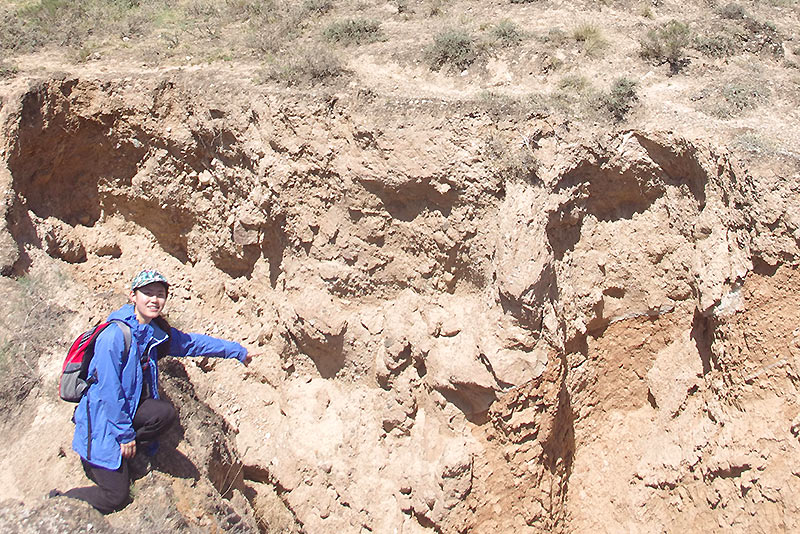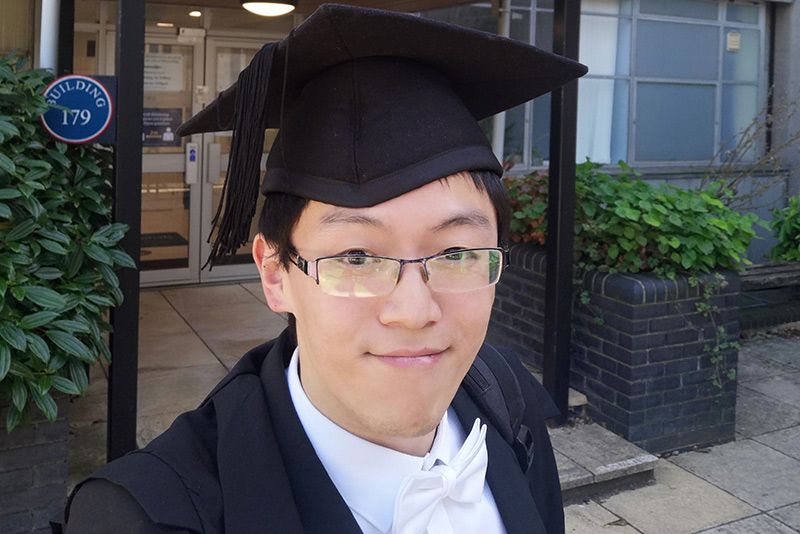Making waves in scientific research
A scholarship programme established in 2010 has provided over 30 students from mainland China with the opportunity to undertake doctoral research in the sciences at Oxford. Two recipients of the scholarship share their experiences and highlight the impact that this support has had on their studies.
Improving seismic hazard assessment in China
Qi Ou, DPhil Earth Sciences
Qi Ou was 16 when a devastating earthquake hit the Sichuan region of China in 2008. A magnitude 7.9 quake, it destroyed buildings and triggered landslides, resulting in nearly 90,000 deaths and leaving 4.8 million people homeless. ‘It was quite far away from my home town, but I was abroad at the time with friends from that part of China,’ she recalls. ‘It was a sensational period for all of us.’
It was this experience that motivated Qi to pursue the study of seismic hazard at doctoral level, with a specific focus on the largest recorded earthquake in Chinese history: the 1920 Haiyuan quake. Using both geological and seismological methods – a combination that enabled her to ‘see through the lens of the entire solid earth as well as look down from space at the surface’ – Qi set about reassessing the earthquake’s oft-quoted magnitude of 8.7.
 Qi on a field trip in 2018, pointing at a cross-section of the Haiyuan Fault. Photo by Jingxing Yu
Qi on a field trip in 2018, pointing at a cross-section of the Haiyuan Fault. Photo by Jingxing Yu
‘The conclusion of my study was that the magnitude has been overestimated,’ she explains, ‘and that’s important because the size of an earthquake will determine the energy budget, but it will also affect the frequency of other seismic events in the area. So if you have a big earthquake taking all of the energy then the subsequent events will be less frequent or smaller, and vice versa.’
Although Qi was delighted with the outcome, her research has not been without its challenges. Not only was the historic data that she needed difficult to find (‘it’s depreciating, dying’), Qi was reliant on geologists in 13 different countries to dig it out of archives for her. They would then need to locate scanners large enough to accept the original paper records, with the resulting high-resolution files requiring digitisation, correction and analysis by Qi.
The fact that she had funding throughout her DPhil, including through the scholarship, inspired Qi to pursue this type of work. ‘I felt very supported,’ she explains, ‘and that support meant that I took on what interested me, rather than what I knew would be productive. It led to some bolder decisions and enabled me to venture into fields that are not traditionally the forte of my group.’
‘Without the funding I don’t think I would have dared to delve into this kind of project’
Alongside her doctoral research, Qi also spent time remotely volunteering for the Zhuoming Disaster Information Service, an NGO based in China. Although traditionally focused on natural hazards, this year the organisation responded to the coronavirus pandemic, with Qi leading a team dedicated to modelling future PPE demand and peaks in medical need.
Through both experiences Qi has ‘observed the ways that change can be made, resilience can be built and hazard preparedness improved’ – something she wishes to continue exploring upon the conclusion of her studies this year. ‘There are a lot of neighbouring fields that I could connect with in the future,’ she notes, ‘so I’m trying to find those links and see how I can make the bridges stronger.’
Harnessing the healthcare potential of flexible electronics
Kai Zhang, DPhil Materials
In recent years diabetes has become a significant global public health issue, with an estimated 422 million people worldwide living with the condition. Occurring either when the body does not produce enough insulin or when it cannot effectively use the insulin it does produce, it is vital that people with diabetes manage their blood glucose levels to remain well.
It is this process that doctoral student Kai Zhang has been targeting since coming to Oxford in 2016. Alongside colleagues in the Polymers Group, Kai has been developing a flexible sensor that will enable chemical concentrations in body fluid – for example glucose levels in sweat – to be monitored in real time and communicated to a mobile phone or smart watch. ‘It will help patients with chronic conditions get on with their lives,’ explains Kai.
 Kai after completing his viva. Photo by Yizhi Wang
Kai after completing his viva. Photo by Yizhi Wang
Although some commercial prototypes of this technology do already exist, Kai’s doctoral research has focused on developing a method that will enable its mass production. ‘The current prototype is very expensive so it just stays in the lab,’ he says. ‘What I’m trying to do is to extend this technique on the industrial level and solve some of the different issues that go along with that.’
One of Kai’s greatest achievements since joining the University has been to develop a small-scale signal amplifier – a very important part in the flexible sensing system. His ability to focus on this complex work has been enhanced, he says, by having a scholarship: ‘It has been very helpful because I haven’t worried at all about money. I have been able to focus 100% on my research.’
The scholarship programme has been generously supported by Chris Gradel and PAG, an Asia-focused investment management firm. The programme provides support for doctoral students within the Mathematical, Physical and Life Sciences Division and the Social Sciences Division (excluding Archaeology).
SUPPORT STUDENTS AT OXFORD